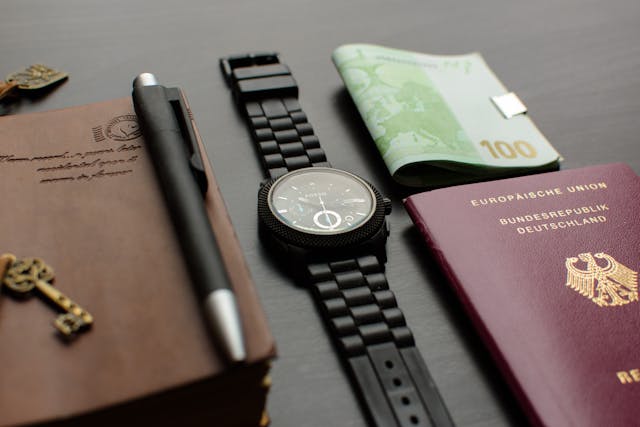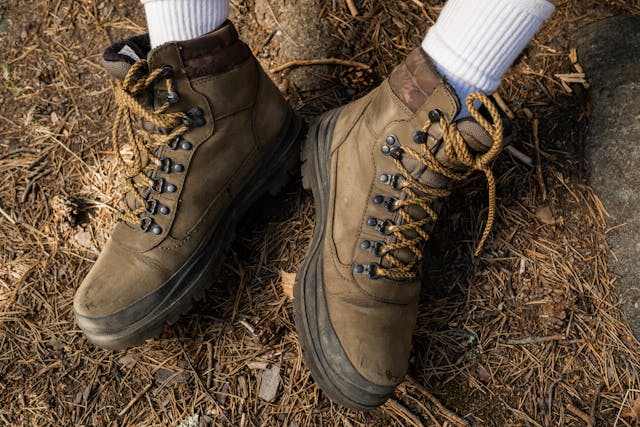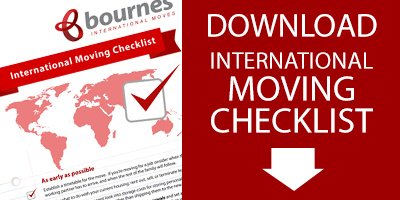Moving internationally is an exciting adventure, but it can also be an intimidating challenge. One of the most common concerns our customers have is ensuring they don't pack anything they shouldn't.
This can be a concern for a number of reasons including:
- Some items may be restricted or prohibited in your destination country. This could mean additional costs for treatment or disposal, or duties and taxes you haven't budgeted for.
- Some items are safer travelling with you in person.
- Some items may cause a safety hazard (risking your belongings and the health and safety of vessel operators and moving staff).
In this article we'll explore some of the key areas to consider when it comes to what not to pack for your international move to help you save time, money and stress.

1) High-value items or items of sentimental value
Jewellery, family heirlooms, photo albums, coin or stamp collections, personal home videos and other similar memorabilia can be irreplaceable, While it might be tempting to pack them away safely in your shipment we would recommend carrying these personally as allowed by law.
Most movers' terms and conditions (especially BAR members whose T&C are trading standards approved) will state that they cannot move items such as jewellery, watches, trinkets, precious stones, money etc. for you. Many international removals insurance policies also exclude these items from cover.
2) Important personal and financial documents
Consider which documents may be worth carrying personally as loss or damage could have serious implications, including problems setting up your new life abroad. You may also need access to some of these items while your shipment is in transit, especially if there are any delays. Types of documents to review include:
- Passports and other ID
- Medical records
- Insurance policies
- Driving licenses
- Tax filings
- Documents for stocks and securities
- House deeds
- Chequebooks
- School records
- Marriage and birth certificates or certificates of adoption
- Visas
- Immunisation and school records for children
- Professional qualifications and accreditations
- Pet documentation
It's a good idea to make copies of ALL of these things regardless of whether you pack them or carry them personally. You can either do this digitally by scanning and using an online document service like Dropbox (or even emailing them to yourself or storing on a USB hard drive) or by taking photocopies to keep separately from originals (or both!).
Don’t forget to back up your PCs and laptops!
 Photo by Omar Markhieh
Photo by Omar Markhieh
3) Medication
This is something you’ll need to be extremely careful about due to the laws that surround the importation of drugs into foreign nations. Each country will have their own rules, so check what applies to where you’re going specifically, but generally it’s advised that if you have a medical condition which requires regular medication you should travel with just enough to cover you until you can get more from a doctor or pharmacy in your new country.
Take the time to research where you can get your medication from BEFORE you go (some countries won’t stock it if it contains a banned substance or it will be stocked under a different name), and you’ll need to check that you are allowed to bring it in with you freely or whether you need a doctor’s certificate.
4) Restricted or prohibited items
Customs departments in each country have a list of items that are either restricted and prohibited items.
Restricted items may require additional paperwork or procedures, whereas prohibited items cannot be imported at all.
Check the list for your destination before you start packing to make sure you don't pack anything that will get you into trouble or cost you to resolve.
What can happen if I pack restricted or prohibited items?
That depends on what you pack and where you're going. Here are some examples of possible impact of packing something you shouldn't:
- Delays whilst your shipment is held at customs
- Fines, penalties or even criminal charges
- Additional costs to return the items back to the origin country, treat them or destroy them
Some examples of commonly restricted or prohibited items include:
- Counterfeit goods
- Foodstuff, alcohol and tobacco
- Firearms and ammunition
- Radio transmitters
- Furs, feathers, skins, tusks etc. from protected species
- Products containing plant material (including Christmas decorations like pine cones or dried flowers).
To find out if you can ship items to your destination, and what you might need to do/know beforehand check out the FIDI customs guides.
 Photo by Steve Johnson from Pexels
Photo by Steve Johnson from Pexels
5) Items that contain traces of food, soil or dirt
Some destinations, particularly island nations like Australia and New Zealand, are fiercly protective of their bio-diversity. Customs inspectors want to be sure that items you're moving contain no traces of soil or dirt that could bring in pests or diseases.
You can move them, but make sure you have thoroughly cleaned and dried any items that have been in contact with food, soil, plants or animals. Common items of concern include:
- Bikes
- Sports equipment
- Camping equipment
- Shoes and trainers
- Outdoor play equipment
- Garden Furniture
- Garden tools
- Waste Bins
- Vacuum cleaners and brooms/dustpans and brushes
- Rugs/mats
If you do try to import items that are not completely clean you may experience delays and could be charged a cleaning or quarantine fee on arrival.
Find out more about cleaning items for shipping abroad.
 Photo by Ron Lach
Photo by Ron Lach
6) Batteries and other Hazardous items
Most movers will not ship the following items for health and safety reasons:
- Batteries
- Gas bottles
- Aerosols
- Paints
- Firearms
- Fuels
- Oils
- Ammunitions
- and other potentially damaging, dangerous or explosive items.
This is because of the risks they present to health and safety and/or fire.
Lithium-Ion batteries in particular have been in the news a lot recently regarding the risk of fire (battery fires are very hard to put out!). Items such as electric scooters/bikes or power tools often have high-power lithium-ion batteries which present a risk not only to the lives of the ships crew but also to the safety of your shipment and other containers on board. The British Association of Removers recommend any batteries should be removed before shipping and replaced at destination (or shipped separately with a specialist hazardous cargo operator).
.jpg?width=640&height=402&name=pexels-hilary-halliwell-698485%20(1).jpg) Photo by Hilary Halliwell:
Photo by Hilary Halliwell:
7) Items you'll need whilst your shipment is in transit
Surprisingly it's not uncommon for movers to receive a frantic phone call from a customer who has accidentally left something important in a box or bag that they need urgently - passports, house keys, flight tickets, phone chargers etc. are all among the items we've hastily retrieved before the container is sent to the port.
Make a checklist of things you need to keep and move them into a separate area before the movers arrive with clear labelling not to pack.
8) Pets
Ok, so this one is sort of in jest.... sort of. It's very VERY rare, but not unheard of for pets (particularly cats) to investigate places they shouldn't and climb into warm comfortable spaces. Before your removals crew depart please check all pets are accounted for to ensure they haven't made a cosy bed in the packing paper!
By following these guidelines, you can avoid any headaches or delays at customs and ensure your move goes smoothly.

.png)









